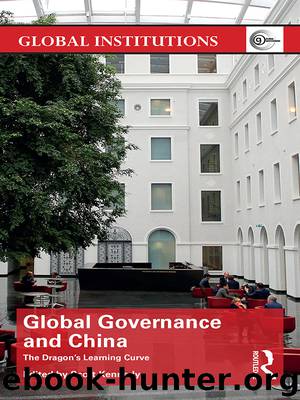Global Governance and China by Scott Kennedy

Author:Scott Kennedy
Language: eng
Format: epub
Publisher: Taylor & Francis (CAM)
1992–2001: shifting gears in response to foreign pressure and domestic change
Relations over IP remained tense throughout the late 1980s and 1990s. The United States decried China’s failure to protect US-held IP. Threats of trade wars, counter-threats, and official reports of egregious violations of US-held IP rights ensued. In January 1992 the United States and China concluded an MoU on IP.
In 1992 China amended its patent law to conform to OECD standards. It extended the invention patent term from 15 to 20 years, and the utility model and design protection from five to 10 years. It allowed for patenting of chemicals, pharmaceutical products, food and beverages, and chemical products.
The proximate cause of the 1992 amendment was US pressure, but the deeper domestic shift to reignite economic reforms put on hold by the 1989 Tiananmen crisis was captured by Deng Xiaoping’s famous Southern Tour (nanxun). Domestically, China doubled down on its efforts to improve its scientific and technological capacity. It sought to deepen market reforms and to promote commercialization of its scientific achievements. New laws in 1993 offered royalty-sharing opportunities for domestic inventors and designers, qualified ownership possibilities, and increased autonomy for SOEs. In 1995 the government committed to providing further investment in and incentives for basic research, high technology, and commercializing technology.11 These changes led to both a surge in domestic patenting and a large spike in foreigners filing invention patents in China.
Despite the 1992 reforms, the US Trade Representative (USTR) continued to pressure China. Tempers flared again in 1995. China rebuffed US demands that China shut down 29 factories that allegedly produced millions of copies of American software and movies.12 The United States threatened to block Chinese accession to the WTO and to levy US$2.8 billion worth of trade sanctions. China claimed that it would hold up applications of American companies seeking to establish businesses in China and suspend joint venture negotiations with American automobile manufacturers.13 In 1995 and 1996, in the shadow of US pressure and China’s efforts to join the WTO, China and the United States reached multiple IP agreements.14
China’s quest to join the WTO gave its trading partners leverage in the accession process. The United States and the European Community (EC) opposed its accession for many years and only relented after China made major concessions that the United States and EC demanded, such as waiving the developing countries’ grace period for implementing TRIPS. China would enjoy no transition period.15
This second era began with foreign-induced policy change in which China aligned its patent laws with stricter OECD standards. Its desire to join the WTO kept foreign pressure on pre-accession policy change steady and effective. China adopted domestic policies to further invigorate and incentivize domestic technology production and innovative activity.
Download
This site does not store any files on its server. We only index and link to content provided by other sites. Please contact the content providers to delete copyright contents if any and email us, we'll remove relevant links or contents immediately.
| Anthropology | Archaeology |
| Philosophy | Politics & Government |
| Social Sciences | Sociology |
| Women's Studies |
The Secret History by Donna Tartt(18794)
The Social Justice Warrior Handbook by Lisa De Pasquale(12109)
Thirteen Reasons Why by Jay Asher(8761)
This Is How You Lose Her by Junot Diaz(6734)
Weapons of Math Destruction by Cathy O'Neil(6107)
Zero to One by Peter Thiel(5652)
Beartown by Fredrik Backman(5568)
The Myth of the Strong Leader by Archie Brown(5392)
The Fire Next Time by James Baldwin(5218)
How Democracies Die by Steven Levitsky & Daniel Ziblatt(5105)
Promise Me, Dad by Joe Biden(5059)
Stone's Rules by Roger Stone(5004)
A Higher Loyalty: Truth, Lies, and Leadership by James Comey(4817)
100 Deadly Skills by Clint Emerson(4816)
Rise and Kill First by Ronen Bergman(4671)
Secrecy World by Jake Bernstein(4612)
The David Icke Guide to the Global Conspiracy (and how to end it) by David Icke(4588)
The Farm by Tom Rob Smith(4413)
The Doomsday Machine by Daniel Ellsberg(4389)
